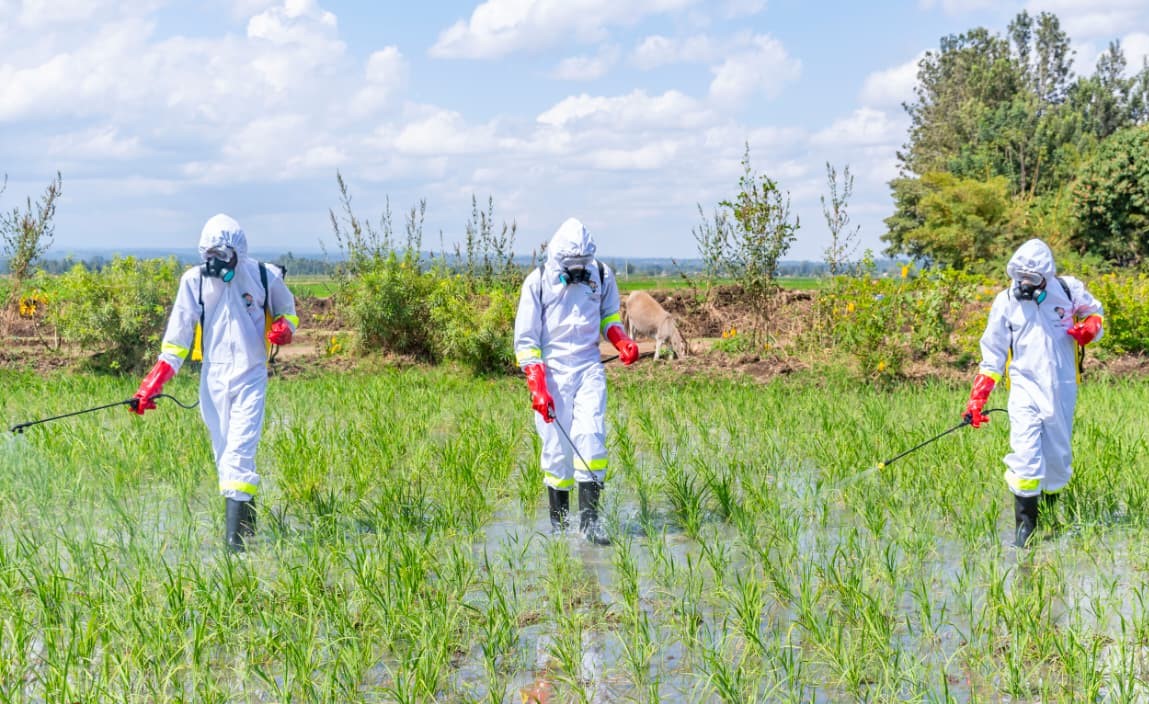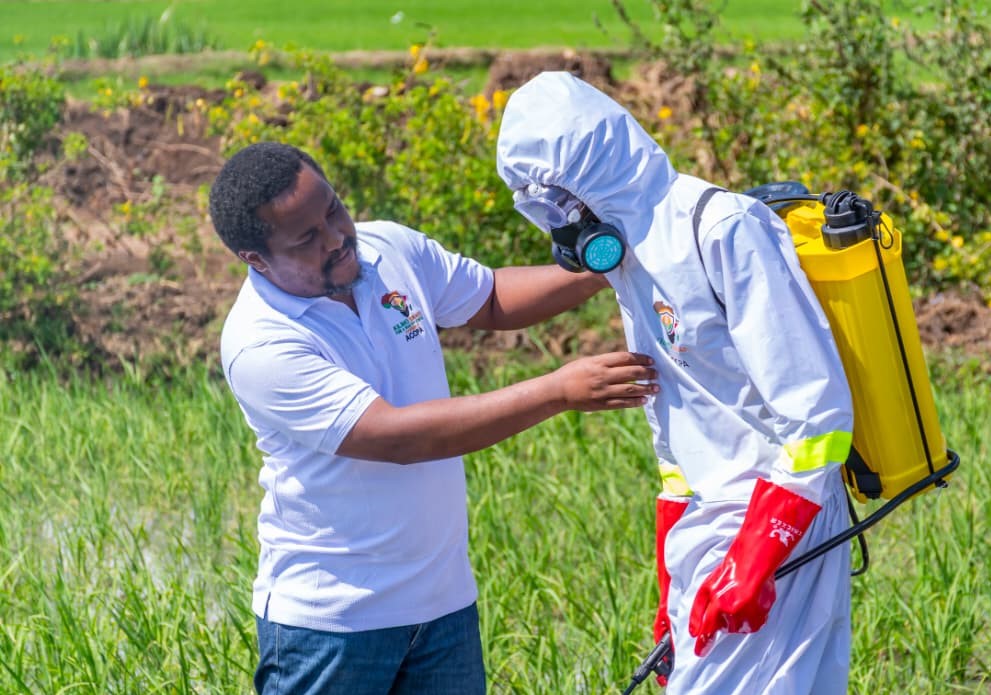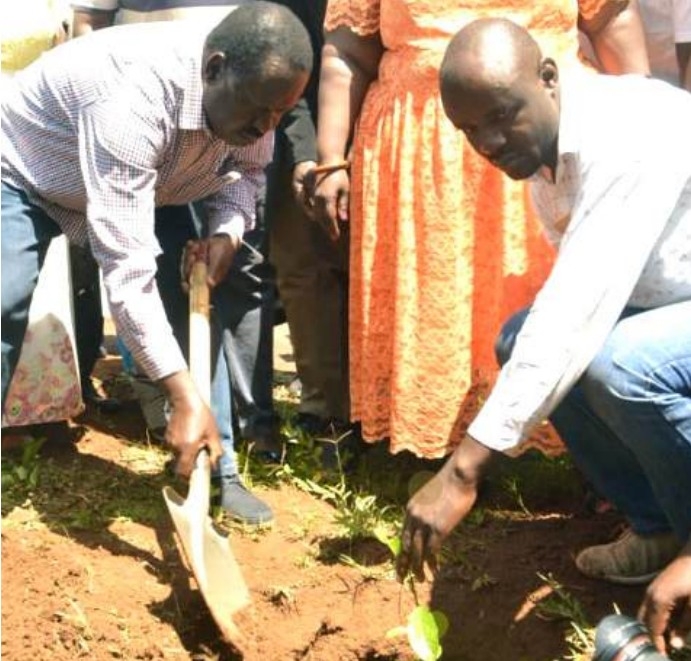
 Trainers showing how farmers should use personal protective equipment while spraying their farms during a sensitisation forum in Mwea, Kirinyaga/ALICE WAITHERA
Trainers showing how farmers should use personal protective equipment while spraying their farms during a sensitisation forum in Mwea, Kirinyaga/ALICE WAITHERA James Mwangi, the executive director of African Centre for Corrective and Preventive Action (ACCPA), helps a farmer put on personal protective equipment in Mwea, Kirinyaga./ALICE WAITHERA
James Mwangi, the executive director of African Centre for Corrective and Preventive Action (ACCPA), helps a farmer put on personal protective equipment in Mwea, Kirinyaga./ALICE WAITHERARice farmers from Kirinyaga County have raised concerns over the high prevalence of health issues that are related to their use of agro-chemicals.
The farmers who spoke during a sensitisation forum organised by the African Centre for Corrective and Preventive Action (ACCPA) in Mwea said most households have been grappling with respiratory and skin conditions and digestive issues that develop over time.
Even worse, their families have been devastated by cancer, which they initially had not associated with their farming practices.
Stella Wanjiru, an elderly farmer, said she does all the farm work by herself, including spraying crops with pesticides.
Years ago, Wanjiru said she started experiencing weakness in her body that later progressed into piercing chest pains that went all the way to her back.
“That is when I realised that these chemicals that I have handled for many years had finally weakened my body,” she said, adding that she then sought medical help and was put on drugs.
Lucy Mburu, a youthful farmer, said she lost her mother to cancer, an occurrence she said is not unique to her family.
Mburu said most farmers haphazardly handle farm chemicals without realising the impact that the repeated exposure has on their health.
“We just continue doing things as we found our parents doing them but now we have realised that we have to make changes to save ourselves,” she said.
Mburu called on the government to put in place stringent measures to ensure only standard chemicals are available to farmers, whom she said are unable to tell the difference.
Mwea farmers have been contending with the invasive golden apple snail that devastates acres of land in the scheme each season.
This has forced some farmers to resort to harmful chemicals, which are said to be imported from a neighbouring country.
Mburu said a huge part of the earnings made from rice farming is channelled towards hospitals as farmers seek medical help for the numerous health issues that they face.
The farmers also called on the government to help them come up with proper ways of disposing of empty agrochemical containers that are discarded in farms and sometimes end up in rivers, contaminating water.
“We need help as soon as possible, otherwise these cancers will finish us all,” Samuel Kariuki said, lauding the ACCPA for training them on the proper handling of chemicals.
Mwea Water Users Association chairperson Peter Chege appealed to farmers to ensure they wear protective gear, especially when spraying their crops.
“As farmers, let’s ensure we have gumboots on and stop wearing T-shirts while spraying our crops. Even as we hope that the government will intervene and support us, let us protect ourselves from too much exposure,” Chege said.
ACCPA’s executive director James Mwangi said most small-scale farmers do not use Personal Protective Equipment (PPE) while handling farm chemicals.
This, he said, exposes them to numerous health issues that balloon the health burden in most parts of the country.
Even worse is the fact that some of the chemicals have been found to contain harmful components which have been banned in western countries.
In June, Agriculture CS Mutahi Kagwe banned 77 pesticides and restricted the use of 202 others through the Pests Control Products Board.
But glyphosate, one of the active ingredients in many herbicides, is still widely used despite being associated with neurological disorders, cancers, reproductive and developmental issues, gut microbiome disruption, liver and kidney damage and respiratory and skin conditions among others.
Mwangi said his organisation has embarked on a drive to distribute PPEs to farmers as the fight for safe farming practices continues.
“We plan to issue 3.8 million PPEs to smallholder farmers nationally between now and 2028. This will help protect them from physically contacting the chemicals and save their lives,” he said.
Mwangi noted that in the Mwea irrigation scheme, only about 1,000 of 15,000 farmers use some protective equipment.
Further, the over-use of farm chemicals as farmers try to save their harvests from pests exposes unassuming consumers to harm, he added.
“We need all stakeholders, especially the government, to appreciate the need for farmers to be protected from these chemicals and the benefits of practicing safe farming practices. Nobody is safe because we all consume foods sourced from these farms.”
He appealed to the government, to stem the importation of harmful chemicals from the neighbouring countries and enhance surveillance, especially along the Kenya-Tanzania border that he said is their main entry point.
Instant Analysis
Only about 1,000 out of 15,000 rice farmers use some protective equipment. Even worse, their families have been devastated by cancer that they initially had not associated with their farming practices. The farmers who spoke during a sensitisation forum organised by the African Centre for Corrective and Preventive Action in Mwea said most households have been grappling with respiratory and skin conditions and digestive issues that develop over time.















![[PHOTOS] How ODM@20 dinner went down](/_next/image?url=https%3A%2F%2Fcdn.radioafrica.digital%2Fimage%2F2025%2F11%2F99d04439-7d94-4ec5-8e18-899441a55b21.jpg&w=3840&q=100)
